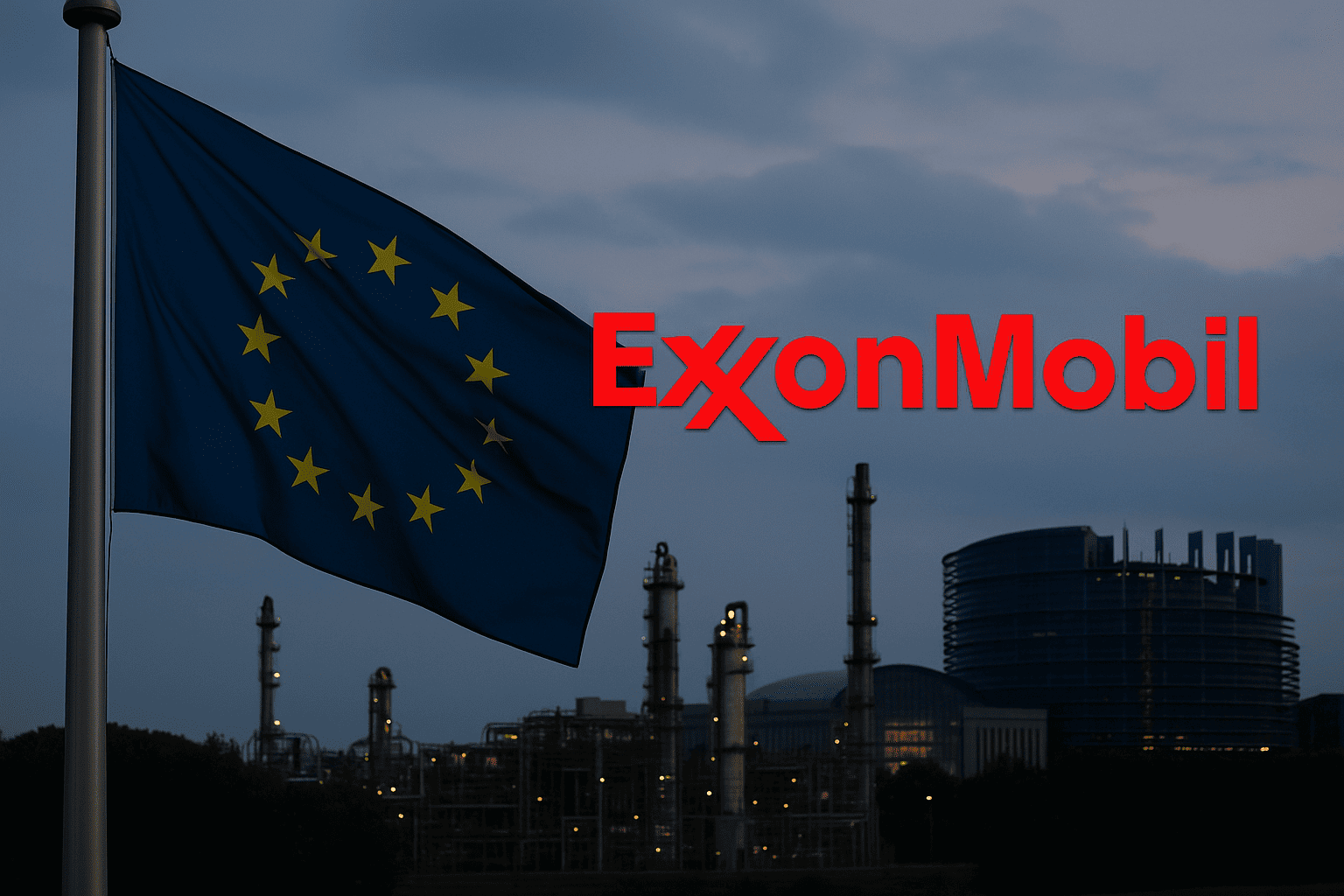ExxonMobil Warns EU Law Could Force Europe Exit, Fines Loom
By Tredu.com • 11/3/2025
Tredu

What happened, and why it matters
ExxonMobil Warns EU Law Could Force Europe Exit, Fines Loom, after CEO Darren Woods said the bloc’s Corporate Sustainability Due Diligence Directive would impose obligations and penalties that make continued operations impractical without substantial revisions. He cited the risk of fines up to 5 percent of global revenue and requirements to implement climate transition plans aligned to a 1.5°C pathway across the company’s entire value chain, including activities outside Europe. The comments, delivered at the ADIPEC gathering in Abu Dhabi, put a fresh spotlight on how far-reaching ESG rules interact with energy security and supply chains.
The crux of ExxonMobil’s objection
Woods argues the draft directive extends beyond European activities, since the due-diligence scope covers global operations and suppliers. He said the law’s transition-plan mandate is technically unfeasible at the pace implied, and that extraterritorial reach could expose the company to penalties that are disproportionate to individual incidents. ExxonMobil is lobbying against the measure, and the firm warns that over-broad language invites interpretation risks, which in turn raise compliance cost and legal uncertainty.
What the EU is trying to do
The Corporate Sustainability Due Diligence Directive seeks to force large companies to identify, prevent, and address human-rights and environmental harms across supply chains, then align transition plans with Paris goals. Lawmakers are still negotiating details, with final text targeted by year end. Supporters say the regime would give investors clearer visibility into risks and hold firms accountable for harms beyond their borders. Opponents say the current draft increases ambiguity, not certainty, due to open-ended obligations.
Energy-security backdrop, and Qatar’s warning
The debate unfolds as Europe balances climate ambition with supply security after Russia’s supply shock. Qatar’s energy minister again warned that the same law could jeopardize LNG supply to Europe, underscoring how policy design can ripple across procurement contracts and investment plans. The minister said Europe needs gas from Qatar and the United States, a reminder that long-term supply depends on workable compliance frameworks as well as prices and volumes.
Read-through for international operators
For oil and gas majors, the directive would formalize board-level responsibility for value-chain risks, create documentation duties for suppliers, and tighten liability standards. Companies would likely expand audit programs, add contractual clauses to supplier agreements, and build central databases that track remediation. The burden could be heavier for firms with complex upstream portfolios that span jurisdictions with different environmental and labor laws. Penalties tied to global sales, rather than regional sales, raise the stakes for diversified groups.
Possible outcomes, from compromise to confrontation
Three scenarios dominate investor conversations. First, a negotiated softening of extraterritorial provisions, plus clearer safe harbors, which would reduce exit risk and narrow litigation exposure. Second, a limited rewrite that preserves 1.5°C-aligned transition plans and global-scope due diligence, keeping pressure on high-emitting sectors and increasing compliance budgets. Third, a breakdown that pushes firms to reassess European footprints, potentially shifting trading, marketing, and some project spending to friendlier regimes. Lawmakers have signaled further talks, which suggests compromise remains possible, yet timing is tight.
What ExxonMobil is doing elsewhere
While warning about Europe, ExxonMobil continues to pursue growth projects, including a fresh agreement to help develop Iraq’s Majnoon field and expand exports, an indicator that portfolio decisions hinge on regulatory clarity and fiscal terms. Management said parameters and payment structures still need to be negotiated, but the move signals a readiness to commit capital where frameworks are predictable.
Investor lens: valuation, cash flow, legal risk
From a valuation perspective, investors will weigh three variables. First, cash-flow stability if European downstream and chemicals operations face higher compliance cost or potential fines. Second, legal risk from litigation tied to value-chain harms, especially where contractual indemnities are weak. Third, strategic optionality, since an exit would shift trading desks, alter refinery runs, and change where carbon-capture pilots or low-carbon fuel ventures are sited. Any shift would carry one-off costs and working-capital swings that analysts will model against potential savings from avoided penalties.
Policy signals to watch
Key markers include Parliament and Council edits to the directive, definitions of control and due-diligence thresholds, clarity on what counts as a Paris-aligned transition plan, and the final calibration of fines. Implementation guidance will matter as much as statute, since regulators will interpret supplier responsibility and remediation duties case by case. Sector-specific standards could emerge, for example for LNG, where long-term contracts and joint ventures complicate responsibility chains.
How the headline translates to operations on the ground
In practical terms, ExxonMobil warns EU law could force Europe exit, a message that signals heightened threshold tests for new capital inside the bloc. Procurement teams would revisit supplier frameworks, boards would re-examine risk budgets for European facilities, and legal departments would scale due-diligence tooling. If fines loom at 5 percent of global revenue, risk committees will ask whether mitigation, insurance, and contractual protections can lower exposure to acceptable levels. If not, footprint adjustments, including asset sales or closures, move up the agenda.
What would reassure markets
Clearer drafting, proportionate penalties, and safe harbors for good-faith remediation would help reconcile policy goals with operational reality. A phased timeline, plus sector guidance, could reduce disruption while still lifting minimum standards across supply chains. The European objective, investor protection through better disclosure and accountability, can coexist with energy security if lawmakers provide executable rules and predictable enforcement.
Bottom line
ExxonMobil’s warning crystallizes a broader tension, strong sustainability ambitions in Europe meet global energy supply requirements. Without clearer scope and proportionate penalties, executives say compliance risk will outweigh returns, and Europe exit scenarios will remain on the table.

How to Trade Like a Pro
Unlock the secrets of professional trading with our comprehensive guide. Discover proven strategies, risk management techniques, and market insights that will help you navigate the financial markets confidently and successfully.


